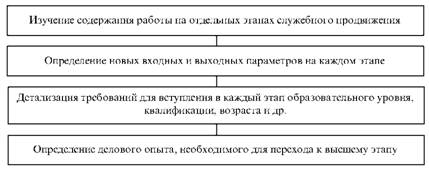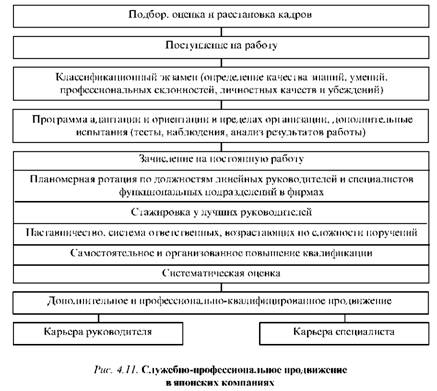home
 Management Management
 International Management - Rodchenko VV International Management - Rodchenko VV
|
International Management - Rodchenko VV
Planning a business career for managers
Managers in foreign corporations rely on the help of management to provide information and advice on the opportunities for promotion. They clearly raise the issue of the distribution of career stages in selected specialties with the aim of planning training for filling vacancies that open with their retirement. In Fig. 4.10 shows the stages of career development managers.
Requirements for career stages include the provision of real opportunities for promotion, not related to mandatory seniority or technical specialization; Increased attention to the evolution of the content of works, new priorities, organizational models; Flexible assessment of the employee; The definition of specific knowledge and skills.

Fig. 4.10. Stages of career development for managers
Planning a business career is especially important in working with young professionals. There has been an increase in the number of fundamental research on the problems of professional advancement, as well as the number of companies investing heavily in solving problems of promotion of young professionals who possess the necessary theoretical knowledge and are potentially capable of taking leading positions. Firms and consultants are studying specific aspects of the promotion process. Experience shows that the career of an employee as an object of planning and management has a significant impact on the stability of the personnel specialization of new employees, motivation to learn new professions and improve skills. In Table. 4.8 shows the typical stages of the manager's career and the needs at these stages.
As an example, a typical scheme of professional and professional promotion in a Japanese company can be cited (Figure 4.11).
It includes a probationary period (1-3 years), during which an employee who has come after graduation passes an additional exam so that the real value of a university diploma can be determined. Further, the employee undergoes a course of orientation in the company's affairs (from 2 weeks to 6 months). A number of inspections are also carried out.
After the probationary period, the employee is recruited for a permanent job, and within a period of 8-10 years, there is a systematic rotation from office to position, from department to department, internship and overseas business trips. There is also a system of responsible assignments, which are becoming more and more complicated with time.
Table 4.8.
Stages of a manager's career and needs
| Career phase |
Age, years |
Needs to achieve the goal |
Moral needs |
Physiological and moral needs |
Preliminary |
Up to 25 |
Studies, tests at different jobs |
Start Self-assertion |
Safety of existence |
Becoming |
Up to 30 |
Mastering the work, developing skills, forming a qualified specialist or leader |
Self-assertion, the beginning of independence |
Safety of existence, health, normal level of wages |
Promotions |
Up to 45 |
Promotion through the career ladder, the acquisition of new skills and experience, the growth of skills |
Growth of self-affirmation, achievement of greater independence, the beginning of self-expression |
Health, a high level of payment |
Conservation |
Up to 60 |
Peak of professional development of a specialist or manager. Improve their skills. Teaching Youth |
Stabilization of independence, growth of self-expression, the beginning of respect |
Raising the level of wages, interest in other sources of income |
Endings |
after 60 |
Preparation for retirement. Preparation of the shift and for a new type of activity in retirement |
Stabilization of self-expression, growth of respect |
Preservation of the level of remuneration of labor and increase of interest in other sources of income |
Pension |
after 65 |
Employment of a new type of activity |
Self-expression in the new field of activity, the stabilization of respect |
The size of the pension, other sources of income, health |
By the age of 36, the employee is already well known to the company, and it can decide its future destiny: to direct it either through the system of movement of leading cadres or through a career of a specialist.

As the system of planned rotation knows that after a certain time it will be promoted and therefore it is necessary to choose a replacement, the managers are updated more dynamically, the movement of the personnel reserve for promotion is more dynamic.
We should also not forget about the various forms of incentives for managers in foreign companies, as well as the need to create a favorable socio-psychological climate in the teams. This is of great importance in managing the career of a manager, as well as in general in his activities.
The main forms of work with personnel abroad are:
• professional orientation;
• Professional and general education;
• Organization of official promotion.
At the same time, much attention is paid to the organization of the learning process in educational institutions and in the workplace. The specific nature of countries, companies and educational systems in these countries is certainly the reason for the existence of different methods and forms of education. But since universalization of management is one of the main trends in international management, the process of universalization is reflected in this sphere of activity.
Abroad allocate significant funds for training specialists both at the national level and at the level of individual companies. The reason for this is the constant tightening of qualification requirements for managers due to the constantly changing state of the external environment and the increasingly complex conditions of modern production. At the same time, despite significant investments, they note the inadequacy of training specialists in universities, including private ones, their isolation from the real processes in the economic activities of companies. One of the ways out of this situation is the organization of internships, the target nature of the training of a specific specialist for a particular enterprise. Specialists also note the inadequacy of training programs, their rapid aging.
The organization of promotion of managers, as a rule, is carried out by planning and management of a career on the basis of the achieved results of work. In this case, the importance of incentive forms, which vary depending on the company.
As for Ukraine, the process of introducing experience with senior staff is complicated at this stage by several specific factors:
• the transitional state of the Ukrainian economy, the introduction of new forms of management and the associated instability in economic and political life;
• the difficult financial situation of most Ukrainian enterprises;
• Lack of well-developed educational programs;
• Insufficient professional competence of managers, first of all employees of personnel services, which is expressed in the inability of psychological reorganization to master new management methods, etc.
Of course, the simple copying of foreign methods of working with personnel without taking into account the peculiarities of Ukrainian enterprises is fraught with a significant negative effect - both economic and psychological. But some methods deserve close attention and can partially be applied in practice.
Questions for self-examination
1. Describe the main trends and concepts of personnel management.
2. What are the stages of strategic personnel management?
3. What is the role of HR services in working with management personnel?
4. How is the training of management personnel abroad carried out?
5. Attestation of management personnel and planning of the business career of the head.


Comments
When commenting on, remember that the content and tone of your message can hurt the feelings of real people, show respect and tolerance to your interlocutors even if you do not share their opinion, your behavior in the conditions of freedom of expression and anonymity provided by the Internet, changes Not only virtual, but also the real world. All comments are hidden from the index, spam is controlled.